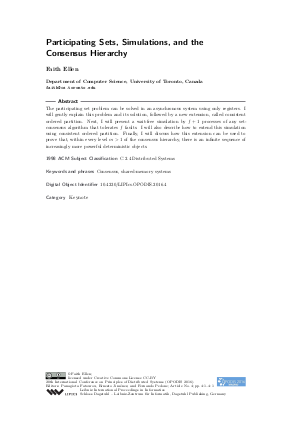Participating Sets, Simulations, and the Consensus Hierarchy (Keynote Abstract)
Author Faith Ellen
-
Part of:
Volume:
20th International Conference on Principles of Distributed Systems (OPODIS 2016)
Part of: Series: Leibniz International Proceedings in Informatics (LIPIcs)
Part of: Conference: International Conference on Principles of Distributed Systems (OPODIS) - License:
 Creative Commons Attribution 3.0 Unported license
Creative Commons Attribution 3.0 Unported license
- Publication Date: 2017-04-06
File

PDF
LIPIcs.OPODIS.2016.4.pdf
- Filesize: 209 kB
- 1 pages
Document Identifiers
Subject Classification
Keywords
- Consensus
- shared-memory systems
Metrics
- Access Statistics
-
Total Accesses (updated on a weekly basis)
0PDF Downloads0Metadata Views
Abstract
The participating set problem can be solved in an asynchronous system using only registers. I will gently explain this problem and its solution, followed by a new extension, called consistent ordered partition. Next, I will present a wait-free simulation by f + 1 processes of any setconsensus algorithm that tolerates f faults. I will also describe how to extend this simulation using consistent ordered partition. Finally, I will discuss how this extension can be used to prove that, within every level m > 1 of the consensus hierarchy, there is an infinite sequence of increasingly more powerful deterministic objects.
Cite As Get BibTex
Faith Ellen. Participating Sets, Simulations, and the Consensus Hierarchy (Keynote Abstract). In 20th International Conference on Principles of Distributed Systems (OPODIS 2016). Leibniz International Proceedings in Informatics (LIPIcs), Volume 70, p. 4:1, Schloss Dagstuhl – Leibniz-Zentrum für Informatik (2017)
https://doi.org/10.4230/LIPIcs.OPODIS.2016.4
BibTex
@InProceedings{ellen:LIPIcs.OPODIS.2016.4,
author = {Ellen, Faith},
title = {{Participating Sets, Simulations, and the Consensus Hierarchy}},
booktitle = {20th International Conference on Principles of Distributed Systems (OPODIS 2016)},
pages = {4:1--4:1},
series = {Leibniz International Proceedings in Informatics (LIPIcs)},
ISBN = {978-3-95977-031-6},
ISSN = {1868-8969},
year = {2017},
volume = {70},
editor = {Fatourou, Panagiota and Jim\'{e}nez, Ernesto and Pedone, Fernando},
publisher = {Schloss Dagstuhl -- Leibniz-Zentrum f{\"u}r Informatik},
address = {Dagstuhl, Germany},
URL = {https://drops.dagstuhl.de/entities/document/10.4230/LIPIcs.OPODIS.2016.4},
URN = {urn:nbn:de:0030-drops-70736},
doi = {10.4230/LIPIcs.OPODIS.2016.4},
annote = {Keywords: Consensus, shared-memory systems}
}
